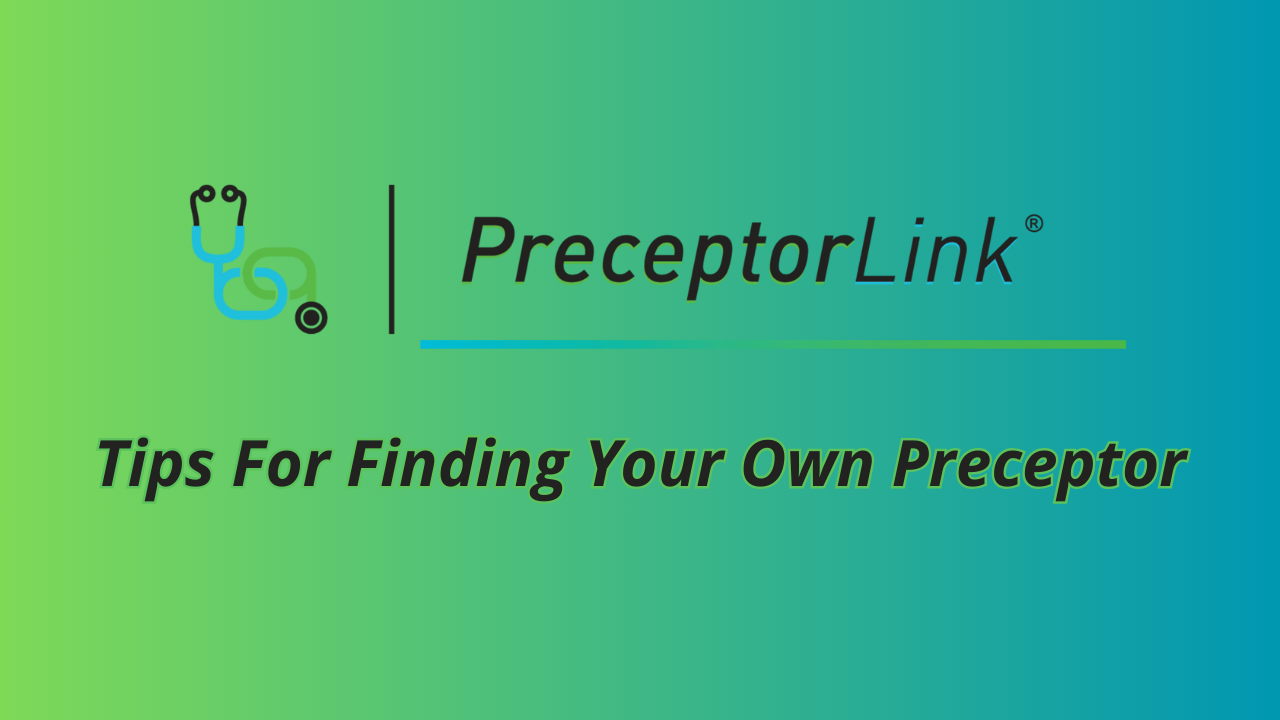|
Hi everyone, it's Lynn McComas, DNP, ANP-C, the nurse practitioner owner of PreceptorLink®. In this video, I will provide you with tips and suggestions on how to find your own preceptor for your rotations. I will discuss the importance of knowing your school's requirements, creating a well-written cover letter and resume, networking opportunities, affiliations with hospitals, and being persistent in your search. If you want us to take the preceptor search off your shoulders, we are happy to help! Please reach out to us at www.preceptorlink.com. Keep on learning! 00:00 Introduction 00:19 Knowing School Requirements 00:58 Creating a Cover Letter and Resume 02:09 Networking Opportunities 02:33 Joining Professional NP Associations 03:29 Utilizing Facebook Groups 03:53 Affiliations with Hospitals 04:59 Pounding The Pavement 05:52 Be Open To Travelling 07:11 Persistence Pays
0 Comments
Earlier this year a student contacted us for assistance in finding a preceptor for her spring clinical rotation. As with every student, we’re excited to help! She described her fantastic preceptor from her current rotation and mentioned this NP had agreed to precept her again if needed.
Many of our students use the same preceptor for multiple rotations, especially in areas where preceptors are not as plentiful. But what are the advantages and disadvantages to this strategy? Why Work Under the Same Preceptor? Relationships take time. Unfortunately, many clinical rotations seem to end about the time you and your preceptor find a steady rhythm. You know how to best present a patient to the preceptor. Your preceptor knows which cases will challenge you. By returning to a previous preceptor with whom you’ve worked well in the past, you have an opportunity to build on that relationship and grow your skills without the awkward adjustment period. At this point, you should be more of a benefit to your preceptor too. If you think you might want to work in the clinic with your preceptor, and your preceptor is considering hiring a new graduate, these hours working together could lead seamlessly into your first NP position. Even if your preceptor isn’t sure they are ready to add another provider when you start, they might find you an indispensable part of the clinic with whom patients are already comfortable. Why Choose a Different Preceptor? Every clinic and hospital department has a different culture. While you may find yourself comfortable within the culture of your current preceptor, you may be missing out on an opportunity that offers more variety and valuable learning experiences. By branching out to multiple preceptors, you learn to be flexible in working with different types of mentors and office staff. You will have an opportunity to see different patient management styles, charting systems, and practice styles. Working with a variety of patient types will definitely help you in the long run. For example, in your current rotation, you may see mostly geriatric patients, which means you have little experience in pediatrics or women’s health. By choosing a different setting that treats more of these other categories of patients you widen your experience which benefits all your patients and your career. Plus, every preceptor has a different leadership style. As a provider, you’re a leader in the clinic. Observing how various providers treat and relate to other staff members helps you formulate your own leadership style. You’ll learn what works and what doesn’t from multiple perspectives. Choosing your preceptor or being matched to a preceptor is a big deal for your future career and your patients’ care. Staying with the same preceptor may be a good idea, especially if you hope to transition into a position there. After all, you are already “tested” and partially oriented! However, we also encourage students to branch out and not remain with the same preceptor for every rotation. A healthy mix of both new and known preceptors builds your skills and your career. You’re winding up your final semester in nurse practitioner school, it’s time to dust off your resume and prepare for the job hunt. Some areas of the country have more nurse practitioners than positions, so it’s important to present your best self to future employers. First Impressions MatterYour first impression starts before you ever answer a call or meet with a prospective employer. Check out this list of dos and don’ts as you enter the workforce of clinicians. Do’s Polish your resume Update education to include advanced degrees Clean up your social media (yes, prospective employers are looking) Write a cover letter List only nursing and clinical history (No need to include your year working at Dairy Queen in high school.) List experience and education starting with the most recent List clinical rotations (Experienced NPs can eliminate this section) Use a synopsis of the type of patients you treated Keep it simple. (1-2 pages is generally sufficient.) Don’ts Don’t include your full address. City and state are fine. (This protects you.) Don’t list your high school or non-industry jobs Don’t list long descriptions of your work (Employers know what nurses do. See note above about synopsis of patients treated instead.) Don’t use crazy fonts or colors. Preparing for the InterviewCongratulations! If you’ve scored an interview you’re well on your way to a new career as a nurse practitioner. In today’s world, most first interviews happen via video call. That doesn’t mean you get to skimp on being prepared though. Start by making sure you’ve dressed appropriately. By wearing your full interview attire including pants or a skirt you’ll feel more self-confident which comes across in the interview even if the interviewer never sees more than your top half. Make sure you’ve styled your hair and look your best. Find a quiet place for your interview with reliable internet. Test the connection beforehand. Also, do a run-through of the interview by turning on your device’s camera and seeing what your interviewer sees. Now’s the time to move the dirty clothes in the background that you didn’t realize would show in the camera shot. Possible Interview QuestionsWe can’t possibly list all the interview questions you might be asked by a prospective employer. We know our favorites, but we did a little research too. Here are some of the most common and general interview questions you’ll probably be asked:
Prospective employers will more than likely also ask situational questions such as:
Review clinical cases you’ve handled and have several stories prepared for the interview. If you haven’t managed any cases exactly like the ones your interviewer describes, relate the case to one you have experienced. You can find lists of great questions to help you prep for the interview online. Some of our favorites are on LinkedIn, Indeed, and The Interview Guys. Negotiating the DealIf you’ve gotten this far in your process, go ahead and do an arm pump and a happy dance. You’ve aced the resume and interview process, and you’re looking at a job offer. Hold up before you sign on the dotted line. The deal you’re being offered may look good at first glance, but take another look. Are you happy with the salary? The vacation time? The extra benefits?
If not, now’s the time to speak up. You don’t have to accept an offer that’s not in line with your goals moving forward. You can negotiate a deal that allows you to move closer to the lifestyle you want to have. Barbara Phillips, APRN, GNP, FNP-BC, FAANP, covers some great information about the business side of being a nurse practitioner. We especially like this article with tips on how to ask for what you want. Yes, by negotiating you do run the risk your prospective employer won’t step up to meet your requests, then you have to decide whether or not this is the job for you. On the other hand, you might just end up with a more comfortable salary, an extra week of vacation, or dedicated charting time. Completing your nurse practitioner degree and passing boards opens an entire world of opportunity for you. We can’t wait to see how you grow our profession! |
About Lynn:As a longtime NP with a desire to help and make positive changes to her beloved profession, Lynn often writes opinion pieces about the NP profession. Archives
July 2024
Categories
All
"Why NPs train on the backs of physicians"
from KevinMD |
|
Jeremiah 29:11
PreceptorLink, Inc.®️ All rights reserved. Website Design by WCW Designs
|





 RSS Feed
RSS Feed

